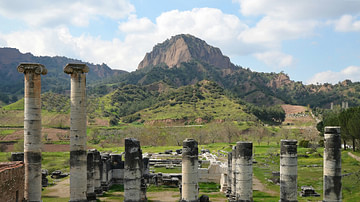Search
Did you mean: Tiye?
Search Results

Article
Tobacco & Colonial American Economy
The most important cash crop in Colonial America was tobacco, first cultivated by the English at their Jamestown Colony of Virginia in 1610 CE by the merchant John Rolfe (l. 1585-1622 CE). Tobacco grew in the wild prior to this time and was...

Article
Melito of Sardis and his Apology for Christianity
Melito of Sardis (d. c. 180 CE) was a bishop in the city of Sardis (near modern-day Sart, Turkey) who was regarded as one of the greatest Christian thinkers, writers, and apologists of his time. In the modern age, he is best known for his...

Definition
Stone Age
From the dawn of our species to the present day, stone-made artefacts are the dominant form of material remains that have survived to today concerning human technology. The term “Stone Age” was coined in the late 19th century CE by the Danish...

Article
Twelve Famous Women of the Middle Ages
Women in the Middle Ages were frequently characterized as second-class citizens by the Church and the patriarchal aristocracy. Women's status was somewhat elevated in the High and Late Middle Ages by the cult of the Virgin Mary and courtly...

Video
The Hanoverian Queens & Consorts of The United Kingdom 7/8
The German Hanoverian Queens of Great Britain and later the United Kingdom had some of the most epic royal matrimonial brawls in history. One brought enlightenment thinking to court. One was dear friends with Marie Antoinette and endured...

Video
Lords of the Mountains: The Foundation of the Armenian Kingdom of Cilicia
For nearly three centuries between 1080 and 1375 a kingdom of exiles from the Armenian Plateau survived in the Taurus Mountains of modern day south-central Turkey. This is the story of the foundation of Armenian Cilicia during the maelstrom...

Video
Queen Catherine de' Medici
Catherine de' Medici from the powerful Italian family married the future King Henry II of France at 13. When he was impaled through the eye during a joust Catherine ruled France as regent for three of her sons during civil and religious wars...

Video
Chenonceau - The Ladies' Chateau
Not only is Le Chateau de Chenonceau one of the most magnificent palaces in France’s Loire Valley, it also has one of the most fascinating histories. It is known as the Ladies’ Chateau for the many women who owned, renovated and left their...

Video
WHERE A REVOLUTION STARTED / Igniting the Spark for TEXAS INDEPEDANCE / Fort Anahuac Texas
HOW A REVOLUTION STARTED, the role of William Travis and Fort Anahuac, where the spark for the TEXAS independence was ignited! Come visit Anahuac Fort and the place that sparked the flame for the WAR for TEXAS Independence. Learn about...

Video
Kings & Queens of England 6/8: The Stuarts - Over Sexed and Over Here
Please consider supporting me at https://www.patreon.com/LindsayHoliday and help me make more fascinating videos! Kings & Queens of England 6/8: The Stuarts – Over Sexed and Over Here How did a gay king shape modern christianity? Why...